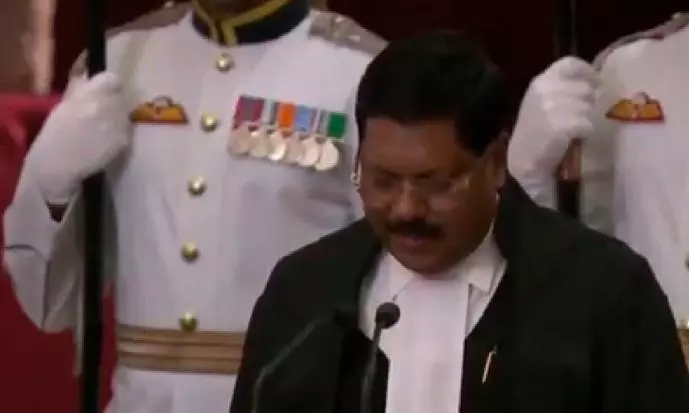
Justice BR Gavai sworn in as next Chief Justice of India
Gavai succeeds Justice Sanjiv Khanna, who demitted office on Tuesday on attaining the age of 65 years

Justice Bhushan Ramkrishna Gavai was on Wednesday (May 14) sworn in as the 52nd Chief Justice of India.
He was administered the oath by President Droupadi Murmu at a brief ceremony at the Rashtrapati Bhavan.
He succeeds Justice Sanjiv Khanna, who demitted office on Tuesday (May 13) on attaining the age of 65 years.
Justice Gavai, who was elevated as a judge of the Supreme Court on May 24, 2019, will have a tenure of over six months and will demit office on November 23, 2025.
Justice Gavai took the oath of affirmation in Hindi.
First Buddhist, second Dalit CJI
Gavai is the first Buddhist and the second person from the scheduled caste community to become the Chief Justice of India.
Justice Gavai was born in Amravati, Maharashtra on November 24, 1960.
His father, RS Gavai, a veteran politician who followed the ideals of Dr BR Ambedkar, served as the Governor of Bihar, Sikkim, and Kerala. His mother was a school teacher.
Also Read: Hard work, service to poor brought him this reward: Justice Gavai's mother
Gavai studied in a local municipal school that lacked basic amenities, often sitting on the floor in class.
With a politician-father, Gavai was initially attracted towards politics, but then decided to focus on a legal career. He graduated in commerce and then in law from Amravati University, and became a lawyer in 1985.
Legal career
He first worked as an independent lawyer, and then served as government pleader and public prosecutor at the Nagpur Bench of the Bombay High Court.
Gavai was appointed as an Additional Judge in the Bombay High Court in 2003, and was made a permanent judge two years later. He handled cases at the Bombay High Court in Mumbai and also at its Nagpur, Aurangabad, and Panaji benches.
Also Read: Justice Bhushan Gavai appointed next CJI, to take oath on May 14
He was appointed a Supreme Court judge on May 24, 2019.
At the apex court, he has been a part of almost 700 benches, and has given nearly 300 judgements in the areas of constitutional law, environmental governance, commercial litigation, and criminal justice.
Key SC rulings
Justice Gavai was a part of the Constitution Benches that delivered key judgements that upheld the abrogation of Article 370, found invalid the Electoral Bonds scheme, and validated the 2019 demonetisation scheme.
He was also involved in other important rulings such as granting bail to Teesta Setalvad in a 2002 Gujarat riots-related case, granting bail to AAP leader and former Delhi deputy chief minister Manish Sisodia, and staying the conviction of Congress leader Rahul Gandhi in the Modi surname defamation case.
Also Read: Chief Justice of India Sanjiv Khanna bids farewell with glowing tributes
Justice Gavai was also a part of benches that delivered firm judgements against the use of bulldozers in illegal demolitions of structures.
In an important 2024 ruling, Justice Gavai gave a powerful separate opinion supporting sub-classification within the Scheduled Caste quota, arguing that not all beneficiaries begin from the same point in life.

